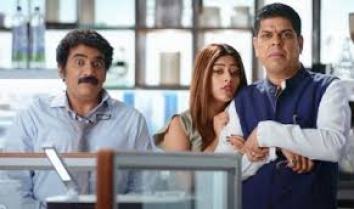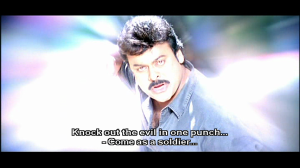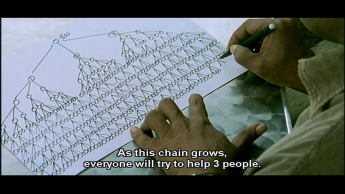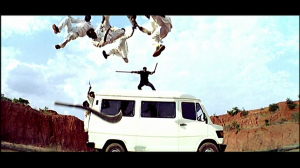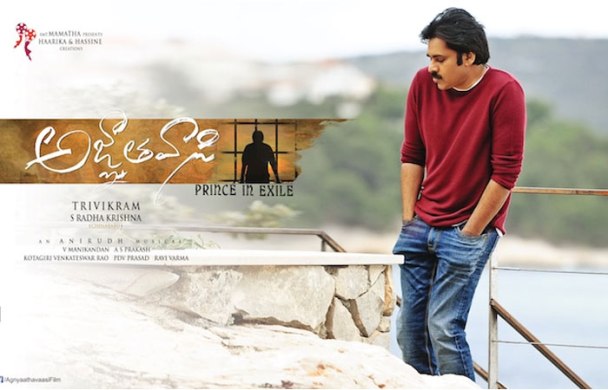 Despite a stellar cast and a rocking soundtrack, Agynyaathavaasi turns out to be a rather disappointing watch. Trivikram takes an interesting plot and fills it chock full of masala, to the extent that the story of a son’s mission to exact vengeance on his father’s killers becomes lost in the morass of comedy, romance and OTT fight scenes. Nothing too much out of the ordinary for a Telugu film then you might think, but there is simply too much of everything here, making Agynyaathavaasi a clutter of confusion instead of the thrilling action film it could have been.
Despite a stellar cast and a rocking soundtrack, Agynyaathavaasi turns out to be a rather disappointing watch. Trivikram takes an interesting plot and fills it chock full of masala, to the extent that the story of a son’s mission to exact vengeance on his father’s killers becomes lost in the morass of comedy, romance and OTT fight scenes. Nothing too much out of the ordinary for a Telugu film then you might think, but there is simply too much of everything here, making Agynyaathavaasi a clutter of confusion instead of the thrilling action film it could have been.
The story (when you can catch a glimpse of it) follows the exploits of Balasubramanyam (aka Abhishikth Bhargav aka Bala aka Abhi!) as he attempts to discover who murdered his father and brother, and then follow through to exact revenge. Abhi (Pawan Kalyan) has been raised in secrecy, allowing his younger half-brother to assume the role of heir to his father Vinda’s pharmaceutical empire. Vinda (Boman Irani) is notorious for always having a Plan B, hence the existence of Abhi who is rather oddly is his step-mother’s favourite, despite his exiled status. Indrani (Khushboo) suspects that her son and husband did not die accidental deaths, and calls Abhi back to discover which of the two aspirants to Vinda’s AB Company were responsible for the deed. Varma (Rao Ramesh) and Sharma (Murali Sharma) have been part of the company since its formation, but neither seem up to the challenge of running a multi-national organisation. Both actors do their best, but with poorly etched characters played mainly for comedic value it’s hard to see why they could ever be in the running as suspects for the murders.
Adding more unnecessary slapstick is Raghu Babu as a particularly sleazy office manager whose antics aren’t even remotely funny and who is completely superfluous to the plot. As too are Abhi’s side-kicks, who start off by offering technical support for his scheme to infiltrate the company but end up as a kind of enthusiastic group of cheer-leaders on the sidelines instead. These include Tanikella Bharani as Abhi’s uncle, Srinivasa Reddy and Abhishek Maharshi who all gasp, cringe and applaud at appropriate moments but otherwise have little to do as Abhi smoothly goes about his investigation without encountering too many problems.
Naturally there has to be a romance – so why not two? Anu Emmanuel and Keerthy Suresh are the two women Abhi uses as part of his schemes to discover the truth, which goes some way to explaining the mainly superficial nature of the relationships. Still it does mean a couple of songs and a quick jaunt to Bulgaria in between Abhi’s many fight scenes. Outside of this though, the two actors only appear as light relief in between beautifully staged but surprisingly dull fight scenes.
Normally the saving grace in these films is the performances of the actors, but almost everyone here, including Pawan Kalyan overact like crazy. The Powerstar doesn’t seem engaged with the screenplay at all for most of the film – not surprisingly perhaps, since I found it difficult to engage with too! There’s a bizarre scene where an insightful police officer (Sampath Raj) starts to postulate on who Abhi could possibly be, and manages to reconstruct the entire sequence of events without any clues, witnesses or evidence to back up his theory! It’s another example of needless frills that hinder the story. A flashback sequence would have worked much better and there was no need to add such speculation, particularly when the police officer involved reported that both Vinda and his son died by accident despite Vinda being shot in the head before he plunged to his death from a high-rise.
On the plus side, the music from Anirudh Ravichandler is excellent and suits both the action and romantic sections of the screenplay. The songs are also catchy, but for the most part don’t sit well within the screenplay and most seem to be added rather randomly. Despite this, the choreography is excellent and the locations beautifully filmed. Indeed, overall the cinematography is excellent with some stunning shots of Varanasi near the start of the film. I also liked the attempt to link Abhi’s story to parts of the Mahabharata and the story of Krishna, which helped to fill in some of the back-story that was glossed over rather quickly.
There are some terrific performances too in the midst of all the general scenery chewing. Boman Irani is good and Khushboo is notable in her return to the big screen as Abhi’s step-mother and Vinda’s widow. She’s compelling in her scenes and her understated performance stands out in the midst of all the other melodrama. Also very good is Aadhi Pinisetty as the main protagonist, Seetharam. He gets the balance between arrogant brat and murdering megalomaniac just right while looking dapper and well-groomed at every occasion. Despite only a short amount of screentime Aadhi is impressive and makes an excellent villain once again.
Agynyaathavaasi is simply too uneven to be anything other than a one-time watch. Although there is a good basic storyline, the added fluff and masala buries it too deep and not even the excellent production values can keep it from sinking under all that weight. Although Khushboo and Aadhi along with Anirudh’s music and V. Manikandan’s cinematography are worth seeing, this is really a film best for fans only.
